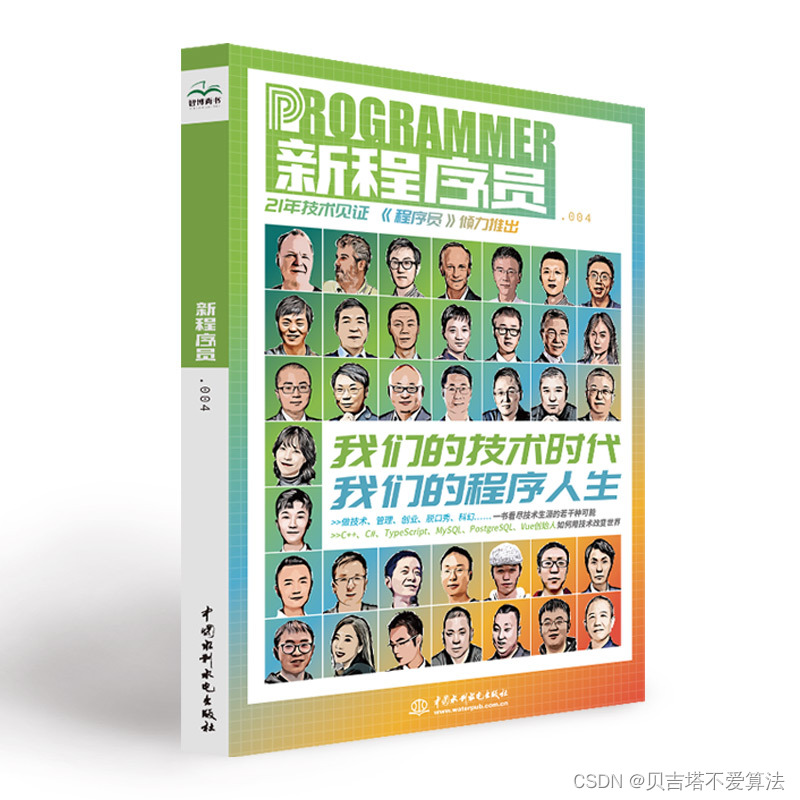在学习了C++的类和对象后,可以动手写一个日期类,以此来巩固和运用类的知识。下面是博主写的日期类,若自己在写的过程中有不懂的地方,可以参考参考
源代码
Date.h
#include <iostream>
using std::cout;
using std::endl;
// 声明Date类
class Date
{
public:
bool IsLeapYear(int year);// 判断闰年
int GetMonthDay(int year, int month);// 根据年和月得到天数
Date(int year = 2022, int month = 5, int day = 19);
Date(const Date& d);
bool operator==(const Date& d) const;// ==的重载
bool operator!=(const Date& d) const;// !=的重载
Date& operator=(const Date& d);// =的重载
bool operator<(const Date& d) const;// <的重载
bool operator>(const Date& d) const;// >的重载
bool operator<=(const Date& d) const;// <=的重载
bool operator>=(const Date& d) const;// >=的重载
Date operator+(int day) const;// +的重载
Date& operator+=(int day);// +=的重载
Date operator-(int day) const; // -的重载
Date& operator-=(int day);// -=的重载
Date& operator++();// 前置++的重载
Date operator++(int);// 后置++的重载
Date& operator--();// 前置--的重载
Date operator--(int);// 后置--的重载
int operator-(const Date& d) const;// 两日期相减
void Print() const;// 日期的打印
Date* operator&();// 取地址的重载,这两个重载不重要
const Date* operator&() const;
friend std::ostream& operator<<(std::ostream& out, const Date& d);// 声明流提取于流插入是Date类的友元
friend std::istream& operator>>(std::istream& in, Date& d);
private:
int _year;
int _month;
int _day;
};
Date.cpp
#define _CRT_SECURE_NO_WARNINGS 1
#include "Date.h"
bool Date::IsLeapYear(int year)// 判断是否为闰年
{
if ((year % 400 == 0) || (year % 4 == 0 && year % 100 != 0))
return true;
else
return false;
}
int Date::GetMonthDay(int year, int month)// 根据年和月得到天数
{
static int monthday[13] = { 0, 31, 28, 31, 30, 31, 30, 31, 31, 30, 31, 30, 31 };
if (month == 2 && Date::IsLeapYear(year))
return monthday[month] + 1;
return monthday[month];
}
// Date的初始化
Date::Date(int year, int month, int day)
{
if (year > 0\
&& month > 0 && month <= 12\
&& day > 0 && day <= Date::GetMonthDay(year, month))
{
_year = year;
_month = month;
_day = day;
}
else
cout << "数据不合法" << endl;
}
Date::Date(const Date& d)
{
_year = d._year;
_month = d._month;
_day = d._day;
}
bool Date::operator==(const Date& d) const// ==的重载
{
return _year == d._year\
&& _month == d._month\
&& _day == d._day;
}
bool Date::operator!=(const Date& d) const// !=的重载
{
return !(*this == d);
}
Date& Date::operator=(const Date& d)// =的重载
{
if (this != &d)
{
_year = d._year;
_month = d._month;
_day = d._day;
}
return *this;
}
bool Date::operator<(const Date& d) const// <的重载
{
if ((_year < d._year) ||
(_year == d._year && _month < d._month) ||
(_year == d._year && _month == d._month && _day < d._day))
return true;
else
return false;
}
bool Date::operator>(const Date& d) const// >的重载
{
/*if ((_year > d._year) ||
(_year == d._year && _month > d._month) ||
(_year == d._year && _month == d._month && _day > d._day))
return true;
else
return false;*/
return (d < *this);// 函数的复用
}
bool Date::operator<=(const Date& d) const// <=的重载
{
/*if ((_year < d._year) ||
(_year == d._year && _month < d._month) ||
(_year == d._year && _month == d._month && _day <= d._day))
return true;
else
return false;*/
return !(*this > d);
}
bool Date::operator>=(const Date& d) const// >=的重载
{
//if ((_year > d._year) ||
// (_year == d._year && _month > d._month) ||
// (_year == d._year && _month == d._month && _day >= d._day))
// return true;
//else
// return false;
return !(*this < d);
}
Date Date::operator+(int day) const// +的重载
{
Date ret(*this);// 先将当前日期值保存下来
ret += day;
return ret;
}
Date& Date::operator+=(int day)// +=的重载
{
if (day < 0)
return *this -= (-day);
_day += day;//先将日期加上n
while (_day > Date::GetMonthDay(_year, _month))// 如果日期大于月份的天数
{
_day -= Date::GetMonthDay(_year, _month);// 天数减去该月份的天数
_month++;// 月要加1
if (_month > 12)
{
_month = 1;
_year++;// 如果月大于12,将年份加1
}
}
return *this;
}
Date Date::operator-(int day) const// -的重载
{
Date ret(*this);
ret -= day;
return ret;
}
Date& Date::operator-=(int day)// -=的重载
{
if (day < 0)
return *this += (-day);
_day -= day;//先将日期减去n
while (_day <= 0)// 如果日期大于月份的天数
{
_month--;// 月要-1
if (_month == 0)
{
_month = 12;
_year--;// 如果月等于0,将年份-1
}
_day += Date::GetMonthDay(_year, _month);// 天数再减去该月份的天数
}
return *this;
}
// +的重载复用+=的重载,+的重载要调用两次拷贝构造
Date& Date::operator++()// 前置++的重载
{
*this += 1;
return *this;
}
Date Date::operator++(int)// 后置++的重载
{
Date d(*this);// 先拷贝当前数据
*this += 1;
return d;// 返回的是当前数据
}
Date& Date::operator--()// 前置--的重载
{
*this -= 1;
return *this;
}
Date Date::operator--(int)// 后置--的重载
{
Date d(*this);
*this -= 1;
return d;
}
int Date::operator-(const Date& d) const// 两日期相减
{
Date max(*this);
Date min(d);
int flat = 1;
if (max < min)
{
flat = -1;
max = d;
min = *this;
}
int day = 0;
while (max != min)
{
min++;
day++;
}
return day * flat;
}
//void Date::Print(Date* const this)
void Date::Print() const
{
cout << "year - " << _year << " - month - " << _month << " - day - " << _day << endl;
}
void Date::Print() const
{
cout << "year - " << _year << " - month - " << _month << " - day - " << _day << endl;
}
Date* Date::operator&()
{
return this;
}
const Date* Date::operator&() const
{
return this;
}
std::ostream& operator<<(std::ostream& out, const Date& d)
{
out << d._year << "-" << d._month << "-" << d._day << endl;
return out;
}
std::istream& operator>>(std::istream& in, Date& d)
{
in >> d._year >> d._month >> d._day;
if (!(d._year > 0\
&& d._month > 0 && d._month <= 12\
&& d._day > 0 && d._day <= d.GetMonthDay(d._year, d._month)))
{
cout << "数据不合法" << endl;
exit(-1);
}
return in;
}
日期的构造函数
首先日期中三个成员变量:年,月,日。当创建一个日期类,要对日期的合法性进行判断,年要大于0,月要在1~12的范围中,天数要根据月份进行判断,还有平年闰年的2月天数不同。
这就有了if的判断条件,但麻烦的是天数最大值要怎么判断,我将其封装成一个函数,输入年和月就能得到该年该月的最大天数。
int Date::GetMonthDay(int year, int month)// 根据年和月得到天数
{
// 将每个月份的天数写进一个数组中,空出数组下标为0的数
// 根据形参month,返回这个数组中下标为month的数
// 但有一个平闰年问题,所以我又写了一个判断闰年的函数,润年返回真,平年返回假
// static将数组定义成静态数组,即数组只创建一次
// 因为后面的函数中调用GetMonthDay的次数很多,用static的话,不用每次都创建数组
static int monthday[13] = { 0, 31, 28, 31, 30, 31, 30, 31, 31, 30, 31, 30, 31 };
// 如果月份是2,并且年份是闰年,返回的天数要+1
if (month == 2 && Date::IsLeapYear(year))
return monthday[month] + 1;
// 不是闰年正常返回
return monthday[month];
}
// 四年一润,百年不润,四百年又一润,if的判断很简单
bool Date::IsLeapYear(int year)// 判断是否为闰年
{
if ((year % 400 == 0) || (year % 4 == 0 && year % 100 != 0))
return true;
else
return false;
}
Date::Date(int year, int month, int day)
{
if (year > 0\ //最后是续行符,表示下一行代码和这行是一起的
&& month > 0 && month <= 12\
&& day > 0 && day <= Date::GetMonthDay(year, month))
{
_year = year;// 将给的year赋值给类中的_year
_month = month;
_day = day;
}
else
cout << "数据不合法" << endl;
}
两个日期之间的比较
比较的运算符有很多(像什么>,<,>=,==),但实际只要实现其中的两个运算符
bool Date::operator==(const Date& d)// ==的重载
{
return _year == d._year\
&& _month == d._month\
&& _day == d._day;
}
bool Date::operator<(const Date& d)// <的重载
{
if ((_year < d._year) ||
(_year == d._year && _month < d._month) ||
(_year == d._year && _month == d._month && _day < d._day))
return true;
else
return false;
}
剩下的运算符重载复用这两个函数就行了,比如我要实现>的重载,>是<和=的逻辑反(一个数如果不大于并且不等于一个数,那么就是小于这个数)
bool Date::operator!=(const Date& d)// !=的重载
{
return !(*this == d);
}
bool Date::operator>(const Date& d)// >的重载
{
return !(*this <= d);// 函数的复用
}
bool Date::operator<=(const Date& d)// <=的重载
{
return (*this < d || *this == d);
}
bool Date::operator>=(const Date& d)// >=的重载
{
return !(*this < d);
}
bool Date::operator!=(const Date& d)// !=的重载
{
return !(*this == d);
}
赋值运算符的重载
这里提一下赋值与拷贝构造之间的区别,赋值是将一个存在对象的值赋值给另一个存在对象的值,而拷贝构造是用一个存在对象的值初始化一个不存在的对象
Date d1(2022, 5, 21);
Date d2(d1);
Date d2 = d1;// 与上面的写法等价,两者都是拷贝构造
Date d3;
d3 = d1;// 这种是赋值
使用赋值的使用,经常会有这样的连等
int a = 10;
int b = 2;
int c = 3;
c = a = b;
=的优先级是从右到左,所以上面的连等是先将b赋值给a,再把a的值赋值给c,因此赋值运算符的重载函数的返回值一个是被赋值的对象(操作数左边的对象)。
// 返回左操作数,该数出了函数还在,所以可以返回引用
// 形参是要被拷贝的对象,由于不用更改d的值,所以能用const修饰,让代码更严谨
Date& Date::operator=(const Date& d)
{
if (this != &d)// 如果是a = a,这样的赋值没有意义,就直接返回
{
_year = year;
_month = month;
_day = day;
}
return *this;
}
没有复用的运算符可以看源代码
加减运算符
首先加减运算符也要支持连等,a = b + c + d,优先级是从右向左,所以返回的也是左操作数。还有就是+和+=不一样,+=的操作数只有一个,并且会改变操作数的值,而+的操作数有两个,不会改变操作数的值
// +=能直接改变原来的数
// 对象出了函数还在,所以能返回对象的引用
Date& Date::operator+=(int day)// +=的重载
{
if (day < 0)// 如果天数是负的
return *this -= (-day);// 复用-=,+=一个负数相当于-=一个正数
_day += day;
while (_day > GetMonthDay(_year, _month))
{
_day -= GetMonthDay(_year, _month);
_month++;
if (_month == 13)// 如果月份从12到13,年份要更新
{
_month = 1;// 月份也要更新
_year++;
}
}
return *this;// 返回当前this指向的对象
}
// +的重载要先将原来的对象拷贝下来,对拷贝的数做加法,不改变原来的对象
// 但是+能复用+=函数
Date Date::operator+(int day)// +的重载
{
Date ret(*this);// 拷贝原来的对象,这样不改变原来对象的值
ret += day;// 这里复用+=
return ret;// ret出了函数就销毁,不能返回引用
}
// -=类似+=
Date& Date::operator-=(int day)// -=的重载
{
if (day < 0)
return *this += (-day);
_day -= day;
while (_day < 0)
{
_month--;
if (_month == 0)// 如果月份从1到0,年份要更新
{
_month = 12;// 月份也要更新
_year--;
}
_day -= GetMonthDay(_year, _month);// _day-=的位置与+=不同,_month先-,_day才减
}
return *this;// 返回当前this指向的对象
}
Date Date::operator-(int day)// -的重载
{
Date ret(*this);// 拷贝原来的对象,这样不改变原来对象的值
ret -= day;// 这里复用-=
return ret;// ret出了函数就销毁,不能返回引用
}
++这样的运算符也是复用+=,但++分为前置和后置,重载的函数都没参数(++为单操作数,但类中的函数隐藏了this指针),要怎么区别前置和后置呢?
Date& Date::operator++()// 前置++的重载
{
return *this += 1;
}
Date Date::operator++(int)// 后置++的重载
{
Date ret(*this);// 先拷贝当前数据
*this += 1;// 再将对象加1
return ret;// 返回加1前的值
}
这里解释下为什么后置++的参数中有一个int:无论是前置还是后置,它们都是没有参数的,编译器为了区分前置后置,规定如果参数中出现了int则为后置,否则为前置(当形参中出现了类型但没有名字,表示该形参不重要,或者是接收了但不使用)。所以int是后置的一种标识符,供编译器区别调用。
Date& Date::operator--()// 前置--的重载
{
return *this -= 1;
}
Date Date::operator--(int)// 后置--的重载
{
Date ret(*this);// 先拷贝当前数据
*this -= 1;// 再将对象-1
return ret;// 返回-1前的值
}
但两者返回值不同,前置能返回引用,后置返回的是拷贝的局部变量,出了函数销毁不能返回引用。
两日期相减
要得到两个日期之间相差几天,就要知道两者之间有几个闰年,不仅如此还要知道大小月,实现起来有点复杂,这里提供一个简单的实现。知道两个日期中较小的,将较小的日期不断++,一边++一边计录天数,直到两者相等,记录的天数就是两这相差的天数
int Date::operator-(Date d)
{
Date max(*this);// 假设this指向的日期时较大的
Date min(d);// d是较小的
int flat = 1;// flat代表结果的正负,这样的情况下,this指向的日期减去d得到的数是正数,flat为正1
if (max < min)// 如果this指向的日期是较小的,调换
{
max = d;
min = *this;
flat = -1;// 此时相减得到的数是负数
}
int day = 0;// 用来记录的天数
while (min != max)
{
min++;
day++;
}
return day * flat;
}
流提取和流插入的重载
首先要理解cout和cin是什么,两者都是一个对象,cout是ostream类的对象,cin则是istream类的对象,而cout和cin为什么支持任意类型数据的输入与输出(对于内置类型)?原因是ostream类和istream类中对<<和>>这两个运算符重载了,当输入一个任意类型的数据时,函数会自动匹配对应的类型
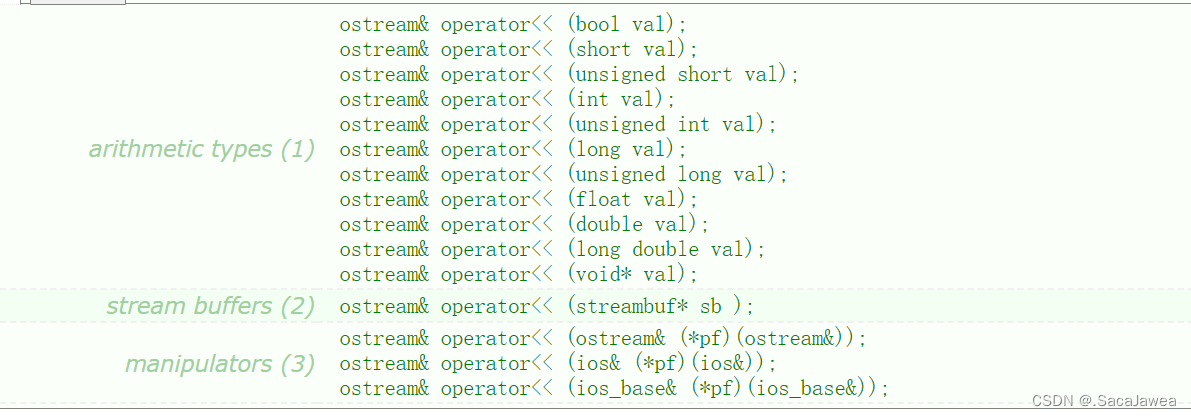
知道了cin和cout的类型,我们就能对<<和>>重载了。
// 流插入的重载
void Date::operator<<(std::ostream& out)
{
out << _year << "-" << _month << "-" << _day << endl;
}
// 流提取的重载
void Date::operator>>(std::istream& in)
{
in >> _year >> _month >> _day;
}
使用时
但有一个问题,用cout不都是cout << d1,这样的吗?怎么重载过后是d1 << cout,相反的?这样的重载看起来很奇怪,需要其他方式进行重载。
上面函数重载奇怪的原因是:类中成员函数的第一个形参是this指针(第一个永远都是this指针),所以调用重载时第一个实参也只能是Date类的对象。要解决这个问题,只能将重载定义在类外,使函数的第一个参数不是this指针
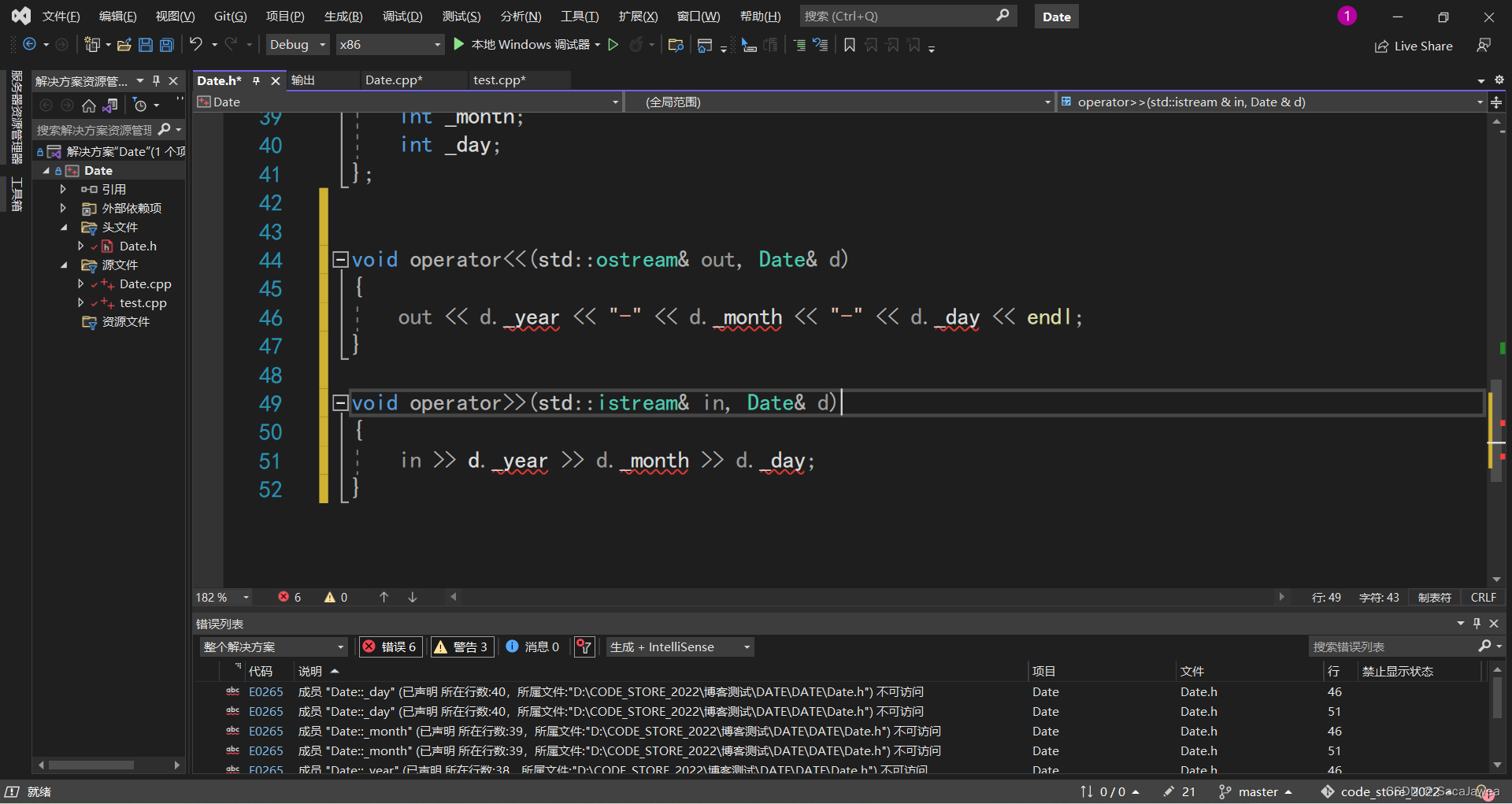
定义在类外后,又有一个问题,Date的私有成员不能访问,因此需要将这两个重载声明成Date类的友元
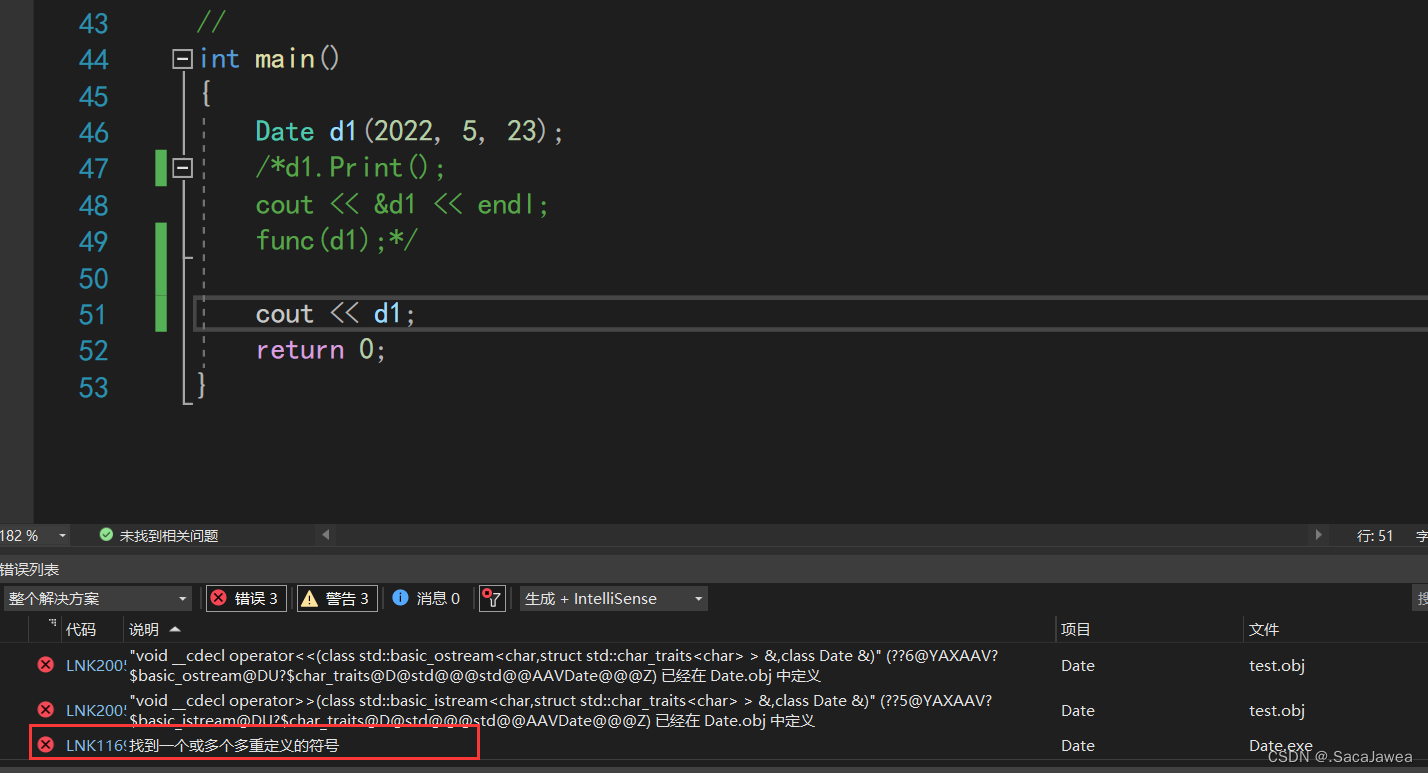
此时再调用的话又有一个链接错误,“找到一个或多个多重定义的符号”,原因是:我将两个函数的重载定义在头文件中,头文件会在两个源文件中展开,源文件合并后这两个重载函数就会出现两次,属于重定义。解决方法就是将函数定义在Date.cpp源文件中,声明在Date.h头文件中
这样的话,这两个函数就值剩下一个问题,就是连续的使用。比如输入多个Date对象,cout << d1 << d2 << d3 << endl,由于重载的函数没有返回值,程序会报错(运算符优先级为从左到右,先输出d1),所以重载的函数需要返回cout,也就是ostream的对象。最后的函数是
// cout的重载
std::ostream& operator<<(std::ostream& out, const Date& d)
{
out << d._year << "-" << d._month << "-" << d._day << endl;
return out;
}
// cin的重载
std::istream& operator>>(std::istream& in, Date& d)
{
in >> d._year >> d._month >> d._day;
return in;
}
关于const

当构造函数和拷贝构造函数都没加const时

为什么会报错?这里涉及到权限放大的问题

+的重载函数返回ret的值,由于ret是局部变量,函数在返回前拷贝ret的值到临时变量中,而临时变量具有常性,可以理解为是const修饰的,不能修改,d1 + 1得到的返回值是const修饰的临时变量,而Date d3 = d1 + 1是一个拷贝构造函数,该表达式等价于Date d3(d1 + 1)
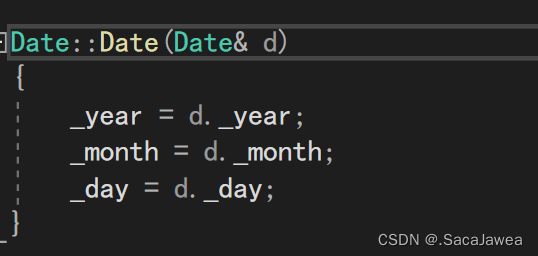
d1 + 1是一个临时变量,作为拷贝构造函数的参数,而该拷贝构造函数的形参为Date&,当引用没有const修饰,实体却有const修饰,属于权限放大,程序当然报错。
同理赋值重载的形参也没加const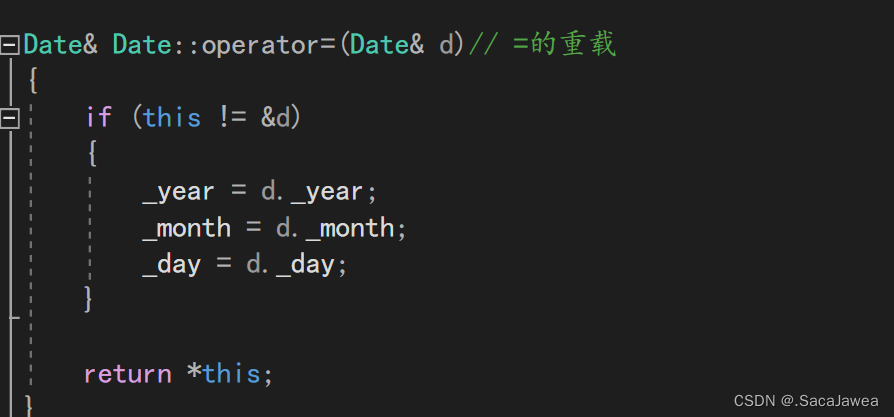
在加上const后程序不再报错
之前一直说当函数不改变对象时,需要对形参的类型加上const表示只读以保护变量的值。比如打印函数,void Print(const int* i),打印一个整形的值,不需要对它进行改变,所以加上const,但看下面的程序,为什么会报错呢?
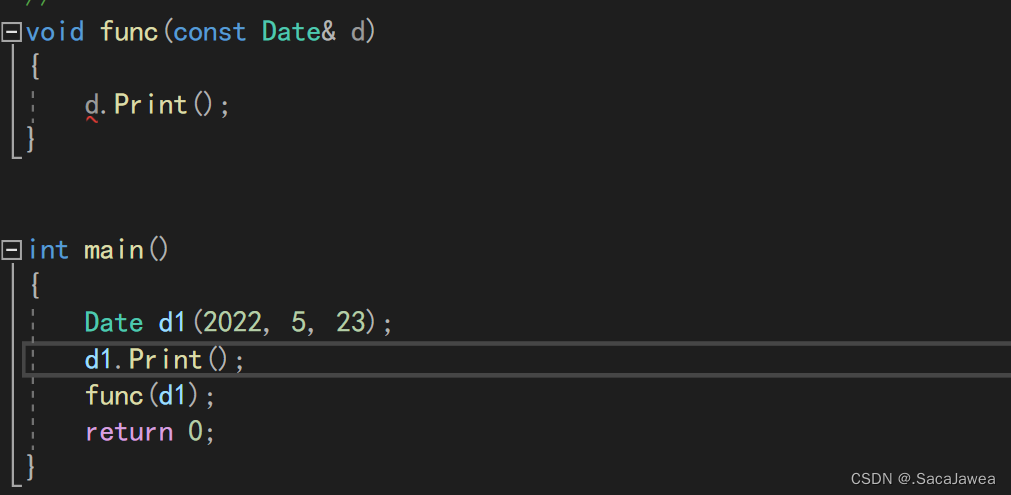


这里给出Print函数的定义,可以看到由于this指针是隐藏在形参中的,所以定义打印这样的只有类对象一个参数的函数时,是不用写参数的。将this显式的写出是这样的
在类的那篇博客中有提到,编译器默认this指针的类型是* const,const在*的右边表示this指针的值不能改变,但能改变this指针指向的对象。
调用d1.Print()时,编译器处理后将d1的地址作为函数形参传给this指针,d1.Print(&d1)。这时的&d1类型是Date *,但调用func函数时,将d1作为形参传给一个引用,该引用用const修饰表示只读,func函数中调用d.Print()时,函数参数也是&d,但由于d是一个const引用,所以这个&d的类型是const Date *,表示这个指针指向对象不能修改,是只读属性。而Date类的Print定义时,编译器默认this的类型是Date * const,const只保护了this没有保护this指针指向的对象,所以将const Date *传给Date * const是一个权限放大的行为,权限放大会引起安全问题,程序报错。
要解决这个问题就必须给this加上const,而this指针是被隐藏的,不能显式的写出,那要怎么加呢?

在整个函数的后面加上const就表示this指针指向的对象为只读类型,不能修改
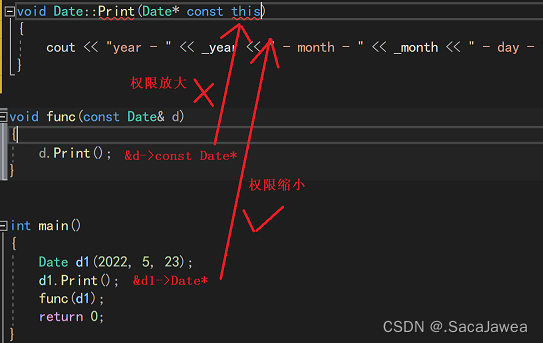
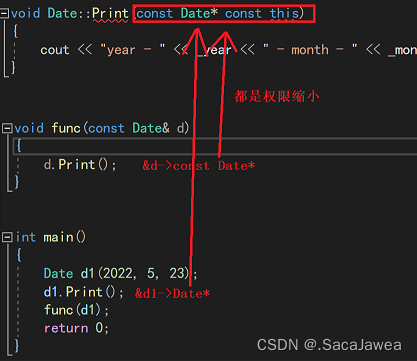
所以对于不修改成员变量的成员7函数,我们都要尽量加上const,这样普通对象和const对象都可以调用该成员函数
还有一种情况
int main()
{
Date d1(2022, 5, 24);
(d1 + 10).Print();// 这样的代码有问题吗?
}
d1 + 10是+的重载,重载函数的返回值是日期类,调用Print去打印这个日期,看上去没有什么问题。但+的重载函数返回的是一个临时变量

由于ret要销毁,为了返回ret的值,将ret的值拷贝到一个临时变量中,该临时变量具有常属性,也就是const修饰,调用Print时,Print函数会传该临时变量的地址,地址类型为const Date*,若Print函数的this指针没用const修饰,属于权限放大,理论上程序会报错(但可能编译器对其优化,使得地址的类型也为const Date*,在vs中程序不会报错)。
虽然这种情况不会报错,但也验证了对于不修改参数的函数,需要用const修饰参数(当const修饰this指针时,const写在函数体的最后)。
几个问题
1.const对象能调用非const成员函数吗?
// 不行,this指针的类型不同,会引发权限放大
2.非const对象能调用const成员函数吗?
// 可以,权限的缩小
3.cosnt成员函数能调用非const成员函数吗?
// 类中的成员函数去调用其他的成员函数,在函数名前会有一个this指针,表示调用该对象的成员函数
// 不行,传的参数有const修饰,形参没有cosnt修饰,属于权限放大
4.非const成员函数能调用const成员函数吗?
// 同理,理解上面的第二点
